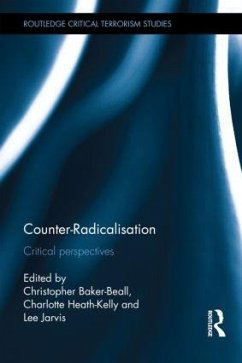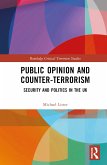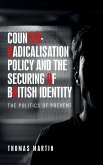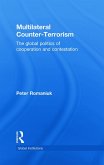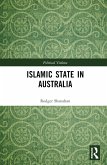Counter-Radicalisation
Critical Perspectives
Herausgeber: Baker-Beall, Christopher; Jarvis, Lee; Heath-Kelly, Charlotte
Counter-Radicalisation
Critical Perspectives
Herausgeber: Baker-Beall, Christopher; Jarvis, Lee; Heath-Kelly, Charlotte
- Gebundenes Buch
- Merkliste
- Auf die Merkliste
- Bewerten Bewerten
- Teilen
- Produkt teilen
- Produkterinnerung
- Produkterinnerung
This book offers a wide-ranging and critical examination of recent counter-radicalisation policies, using case studies from several countries.
Andere Kunden interessierten sich auch für
![Global Jihad, Islamic Radicalisation and Counter Strategy Global Jihad, Islamic Radicalisation and Counter Strategy]() Noor DahriGlobal Jihad, Islamic Radicalisation and Counter Strategy24,99 €
Noor DahriGlobal Jihad, Islamic Radicalisation and Counter Strategy24,99 €![Global Jihad, Islamic Radicalisation and Counter Strategy Global Jihad, Islamic Radicalisation and Counter Strategy]() Noor DahriGlobal Jihad, Islamic Radicalisation and Counter Strategy45,99 €
Noor DahriGlobal Jihad, Islamic Radicalisation and Counter Strategy45,99 €![Public Opinion and Counter-Terrorism Public Opinion and Counter-Terrorism]() Michael ListerPublic Opinion and Counter-Terrorism185,99 €
Michael ListerPublic Opinion and Counter-Terrorism185,99 €![Counter-Radicalisation Counter-Radicalisation]() Counter-Radicalisation40,99 €
Counter-Radicalisation40,99 €![Counter-radicalisation policy and the securing of British identity Counter-radicalisation policy and the securing of British identity]() Thomas MartinCounter-radicalisation policy and the securing of British identity119,99 €
Thomas MartinCounter-radicalisation policy and the securing of British identity119,99 €![Multilateral Counter-Terrorism Multilateral Counter-Terrorism]() Peter RomaniukMultilateral Counter-Terrorism187,99 €
Peter RomaniukMultilateral Counter-Terrorism187,99 €![Islamic State in Australia Islamic State in Australia]() Rodger ShanahanIslamic State in Australia160,99 €
Rodger ShanahanIslamic State in Australia160,99 €-
-
-
This book offers a wide-ranging and critical examination of recent counter-radicalisation policies, using case studies from several countries.
Hinweis: Dieser Artikel kann nur an eine deutsche Lieferadresse ausgeliefert werden.
Hinweis: Dieser Artikel kann nur an eine deutsche Lieferadresse ausgeliefert werden.
Produktdetails
- Produktdetails
- Verlag: Taylor & Francis
- Seitenzahl: 264
- Erscheinungstermin: 18. September 2014
- Englisch
- Abmessung: 239mm x 164mm x 22mm
- Gewicht: 526g
- ISBN-13: 9781138776630
- ISBN-10: 1138776637
- Artikelnr.: 40759455
- Herstellerkennzeichnung
- Libri GmbH
- Europaallee 1
- 36244 Bad Hersfeld
- gpsr@libri.de
- Verlag: Taylor & Francis
- Seitenzahl: 264
- Erscheinungstermin: 18. September 2014
- Englisch
- Abmessung: 239mm x 164mm x 22mm
- Gewicht: 526g
- ISBN-13: 9781138776630
- ISBN-10: 1138776637
- Artikelnr.: 40759455
- Herstellerkennzeichnung
- Libri GmbH
- Europaallee 1
- 36244 Bad Hersfeld
- gpsr@libri.de
Christopher Baker-Beall is Lecturer in International Relations at Nottingham Trent University. Charlotte Heath-Kelly is postdoctoral fellow with the Institute of Advanced Study, University of Warwick. Her most recent book is Politics of Violence: Militancy, International Politics, Killing in the name (Routledge, 2013). Lee Jarvis is Senior Lecturer in International Security at the University of East Anglia. His books include Terrorism a Critical Introduction (2011) and Times of Terror: Discourse, Temporality and the War on Terror (2009).
Introduction, Charlotte Heath-Kelly, Christopher Baker-Beall and Lee Jarvis
1. Radicalisation: The Journey of a Concept, Arun Kundnani 2. UK Prevent
and Community Cohesion: Conflict or Synergy, Paul Thomas 3. How Not to Make
(ex)Terrorists: PREVENT as Ideological Warfare, Phil Edwards 4. Countering
Violent Extremism: Social harmony, community resilience and the potential
of counter-narratives in the Australian context, Anne Aly 5. PREVENT
Abroad: How Do Local Authorities in Berlin Target Violent Islamic
Extremism?, Floris Vermeulen and Julia Berczyk 6. Recognition Masking
Response: Preventing Right-Wing Extremism and Radicalisation, Michelle
Bentley 7. Challenging Far-Right Extremism: The Other Side of the Coin?,
Rocio Cifuentes 8. Mapping the Muslim Community: Attending to the Practices
of Counter-radicalisation in the UK, Nadya Ali 9. Policed Multiculturalism
in Europe: Governing Radicalisation through Partnerships, Francesco Ragazzi
10. Prevent and the Internet, Lella Nouri and Andrew Whiting 11. The
'Radicalised' Subject of Prevent: Challenging Separatist Constructions of
Counter-Radicalisation and Community Cohesion', Thomas Martin 12. Prevent
2011 and Counter-radicalisation: What is Deradicalisation?, Mohammed
Elshimi 13. Refocusing Danish Radicalization Prevention: The (Problematic)
Logic and Practice of Individual 'De-radicalization' Interventions, Lasse
Lindekilde
1. Radicalisation: The Journey of a Concept, Arun Kundnani 2. UK Prevent
and Community Cohesion: Conflict or Synergy, Paul Thomas 3. How Not to Make
(ex)Terrorists: PREVENT as Ideological Warfare, Phil Edwards 4. Countering
Violent Extremism: Social harmony, community resilience and the potential
of counter-narratives in the Australian context, Anne Aly 5. PREVENT
Abroad: How Do Local Authorities in Berlin Target Violent Islamic
Extremism?, Floris Vermeulen and Julia Berczyk 6. Recognition Masking
Response: Preventing Right-Wing Extremism and Radicalisation, Michelle
Bentley 7. Challenging Far-Right Extremism: The Other Side of the Coin?,
Rocio Cifuentes 8. Mapping the Muslim Community: Attending to the Practices
of Counter-radicalisation in the UK, Nadya Ali 9. Policed Multiculturalism
in Europe: Governing Radicalisation through Partnerships, Francesco Ragazzi
10. Prevent and the Internet, Lella Nouri and Andrew Whiting 11. The
'Radicalised' Subject of Prevent: Challenging Separatist Constructions of
Counter-Radicalisation and Community Cohesion', Thomas Martin 12. Prevent
2011 and Counter-radicalisation: What is Deradicalisation?, Mohammed
Elshimi 13. Refocusing Danish Radicalization Prevention: The (Problematic)
Logic and Practice of Individual 'De-radicalization' Interventions, Lasse
Lindekilde
Introduction, Charlotte Heath-Kelly, Christopher Baker-Beall and Lee Jarvis
1. Radicalisation: The Journey of a Concept, Arun Kundnani 2. UK Prevent
and Community Cohesion: Conflict or Synergy, Paul Thomas 3. How Not to Make
(ex)Terrorists: PREVENT as Ideological Warfare, Phil Edwards 4. Countering
Violent Extremism: Social harmony, community resilience and the potential
of counter-narratives in the Australian context, Anne Aly 5. PREVENT
Abroad: How Do Local Authorities in Berlin Target Violent Islamic
Extremism?, Floris Vermeulen and Julia Berczyk 6. Recognition Masking
Response: Preventing Right-Wing Extremism and Radicalisation, Michelle
Bentley 7. Challenging Far-Right Extremism: The Other Side of the Coin?,
Rocio Cifuentes 8. Mapping the Muslim Community: Attending to the Practices
of Counter-radicalisation in the UK, Nadya Ali 9. Policed Multiculturalism
in Europe: Governing Radicalisation through Partnerships, Francesco Ragazzi
10. Prevent and the Internet, Lella Nouri and Andrew Whiting 11. The
'Radicalised' Subject of Prevent: Challenging Separatist Constructions of
Counter-Radicalisation and Community Cohesion', Thomas Martin 12. Prevent
2011 and Counter-radicalisation: What is Deradicalisation?, Mohammed
Elshimi 13. Refocusing Danish Radicalization Prevention: The (Problematic)
Logic and Practice of Individual 'De-radicalization' Interventions, Lasse
Lindekilde
1. Radicalisation: The Journey of a Concept, Arun Kundnani 2. UK Prevent
and Community Cohesion: Conflict or Synergy, Paul Thomas 3. How Not to Make
(ex)Terrorists: PREVENT as Ideological Warfare, Phil Edwards 4. Countering
Violent Extremism: Social harmony, community resilience and the potential
of counter-narratives in the Australian context, Anne Aly 5. PREVENT
Abroad: How Do Local Authorities in Berlin Target Violent Islamic
Extremism?, Floris Vermeulen and Julia Berczyk 6. Recognition Masking
Response: Preventing Right-Wing Extremism and Radicalisation, Michelle
Bentley 7. Challenging Far-Right Extremism: The Other Side of the Coin?,
Rocio Cifuentes 8. Mapping the Muslim Community: Attending to the Practices
of Counter-radicalisation in the UK, Nadya Ali 9. Policed Multiculturalism
in Europe: Governing Radicalisation through Partnerships, Francesco Ragazzi
10. Prevent and the Internet, Lella Nouri and Andrew Whiting 11. The
'Radicalised' Subject of Prevent: Challenging Separatist Constructions of
Counter-Radicalisation and Community Cohesion', Thomas Martin 12. Prevent
2011 and Counter-radicalisation: What is Deradicalisation?, Mohammed
Elshimi 13. Refocusing Danish Radicalization Prevention: The (Problematic)
Logic and Practice of Individual 'De-radicalization' Interventions, Lasse
Lindekilde

